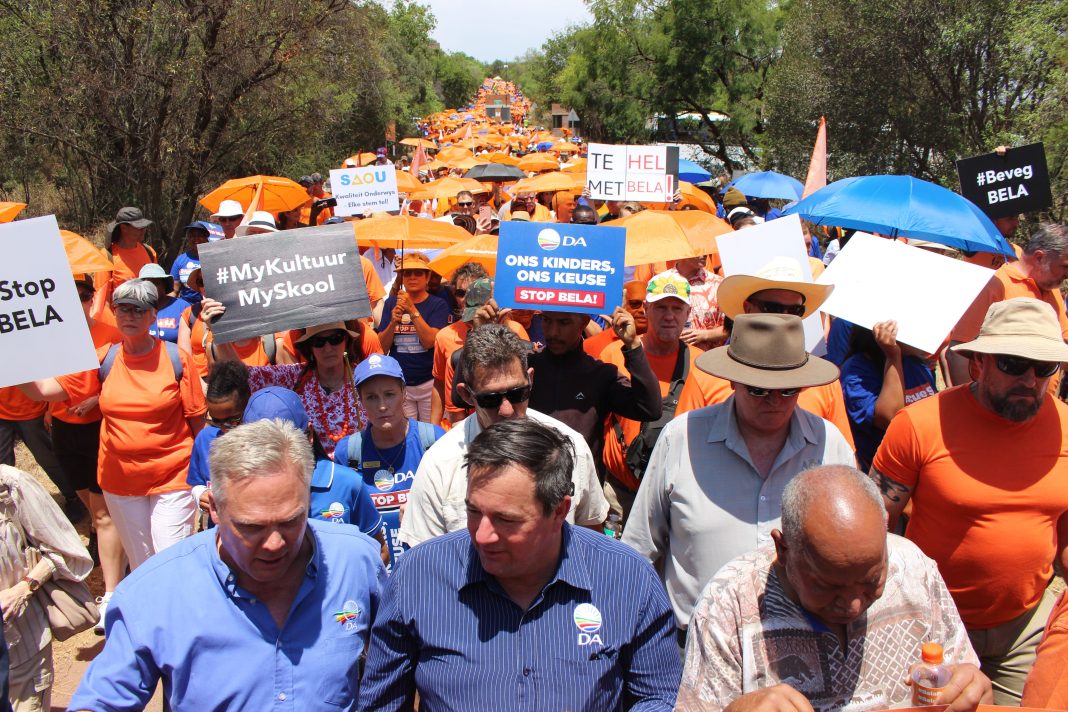By Amy Musgrave
Government officials in Gauteng and the Congress of SA Trade Unions have condemned a protest organised by pro-Afrikaans organisations against the new education law, saying that they are ignoring systematic inequalities that must change.
Thousands of people led by the Democratic Alliance, Freedom Front Plus, the Solidarity Movement and AfriForum demanded in Pretoria on Tuesday that two clauses in the Basic Education Laws Amendment (BELA) Act not be enforced.
The legislation has ignited intense controversy, mainly on clauses concerning single-medium schools, language policies and admission requirements.
At the heart of the debate is the Act’s aim to promote inclusivity and accessibility in education, particularly for historically disadvantaged communities.
Its detractors believe the law sounds the death knell for Afrikaans schools and the Afrikaans culture. The clauses are yet to be implemented as they are being discussed by the Government of National Unity’s conflict resolution committee.
President Cyril Ramaphosa has warned that if a consensus is not reached in three months, the clauses will be enacted.
The crowd was entertained by various singers, including Steve Hofmeyr, who has been called out on many occasions for using racist slurs and accusing Black people of being the architects of apartheid.
Gauteng Premier Panyaza Lesufi, who has been opposed to Ramaphosa not signing the clauses into law, has taken to X, saying that the demonstration was not about the schooling system.
“This is not about education, but those who hate use with a passion! The choice of the orange colour and the artist exposed them big time!”
He went on further to call on Ramaphosa to implement the Act in its entirety.
While orange is in the old South African flag, it is also the colour of AfriForum and Solidarity.
Education MEC Matome Chiloane said the DA’s opposition to the law was a thinly veiled attempt to maintain the status quo of exclusion.
“Their argument for ‘mother-tongue education’ conveniently ignores the systematic inequalities that have historically marginalised our Black learners,” he said on X.
“This is not just about language; it’s about ensuring that every child, regardless of their background, has the right to an equitable education. We will not be deterred by their selfless agenda.”
Cosatu has also demanded that the president immediately promulgated the Act in its current form, as it contained several progressive and long-overdue provisions.
“Whilst Cosatu acknowledges every citizen’s constitutional right to protest, we strongly condemn the individuals in the crowd who saw the march as an opportunity to display old apartheid era flags,” said Cosatu spokeswoman Zanele Sabela.
“The federation calls on the (SA) Human Rights Commission to launch an investigation and hold the responsible individuals accountable particularly as the DA, AfriForum and Solidariteit (Solidarity) have been adamant that their protest against the BELA Act is not about race.”
She said these organisations were creating a storm in a teacup because as the Act currently stood, it provided school governing bodies with the power to draft their school’s admissions and language policies.
“However, the head of the provincial education department has final approval to ensure the policies are not subject to abuse. We have witnessed far too many children chased out of school because they wore their hair in dreadlocks or had hair extensions put in,” Sabela said in a statement.
The legislation affirmed all mother-tongue languages and afforded room for inclusivity and diversity, and its implementation would not spell the end of Afrikaans.
“In fact, affording space for dual-medium instruction where necessary, will ensure that 80% of South African society is not discriminated against,” she said.
Meanwhile, the ANC’s study group on basic education in Parliament has also called on Ramaphosa to promulgate all sections of the Act, accusing protesters on Tuesday night of “disinformation” for claiming that it infringed on rights to be taught in one’s mother tongue.
It agreed with Cosatu that there was no centralisation of power and that the law was not removing all power from SGBs.
“We must be clear that when these ethno-nationalist parties speak of marching for the protection of indigenous languages, it very simply means that they are marching for the protection of the Afrikaans language only and white privilege,” said Tshepo Louw, whip of the ANC study group.
INSIDE EDUCATION







